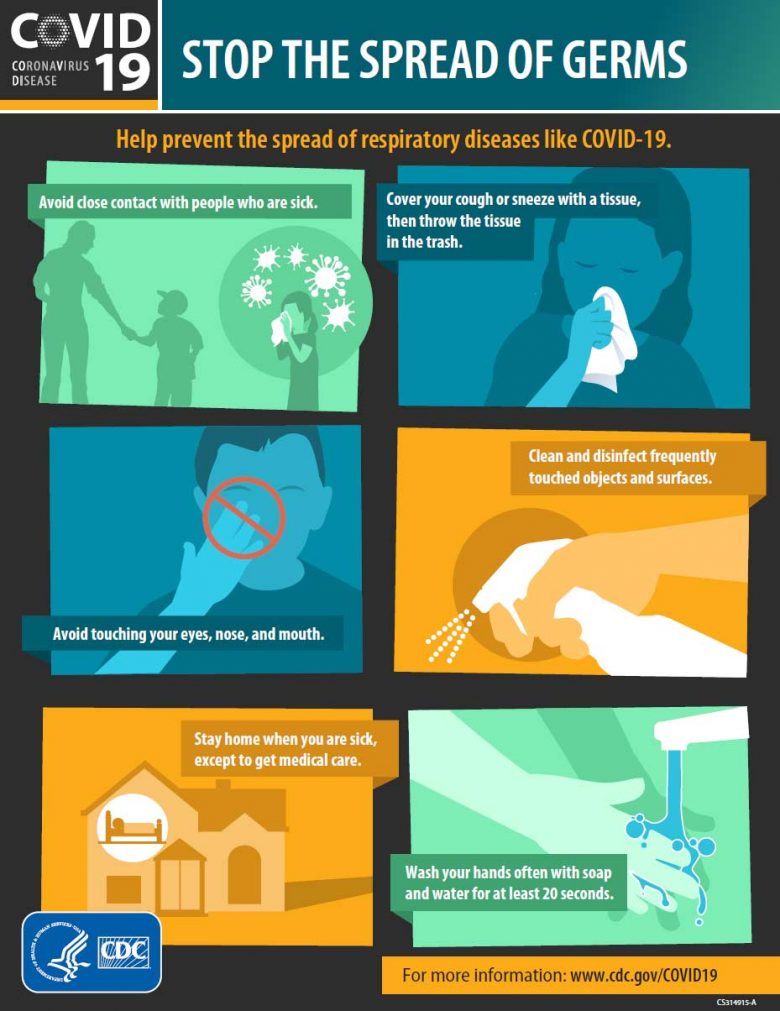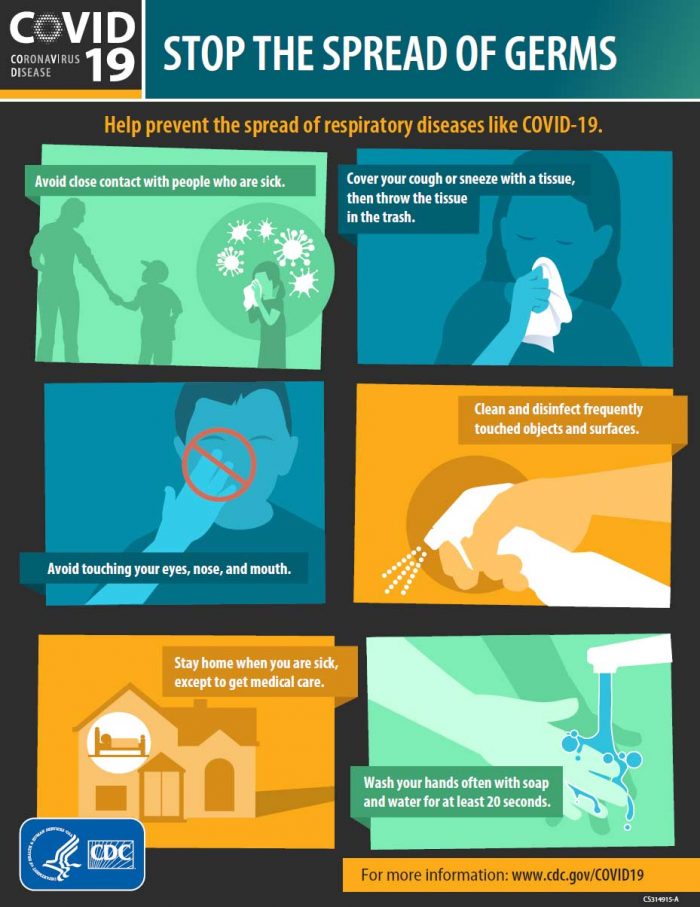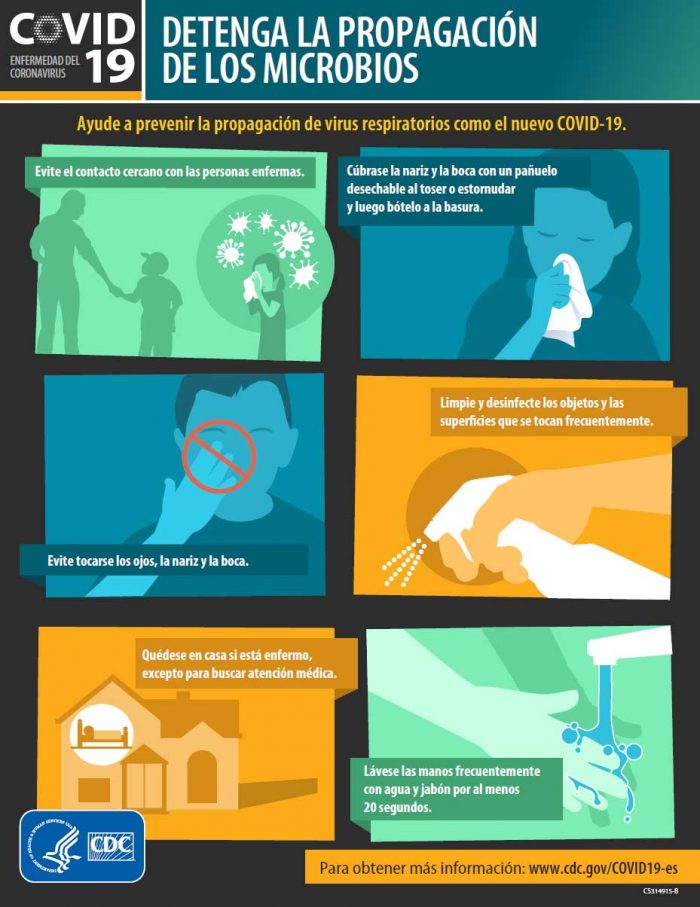Low risk to Lincoln County residents
Lincoln County Public Health, in close coordination with the Oregon Health Authority Public Health Division, Lincoln County Emergency Management, Lincoln County Board of Commissioner’s office and a wide range of local health and medical organizations, has been closely monitoring the emergence of COVID-19 (also known as 2019-n-CoV novel coronavirus) since December 2019.
As of February 27, 2020, Oregon Health Authority (OHA) reports there are no COVID-19 cases in Oregon. If an Oregon case is identified, Lincoln County Public Health will provide additional information and guidance. At this time, the Centers for Disease Control & Prevention (CDC) has advised that your best protection is following standard cold and flu prevention measures as described below.
The information line 211 has been activated for general coronavirus questions. You can dial “211” on your telephone or go to the website 211.org. To assist in sharing current information, we have also launched a new County website linking local information to State and Federal resources. We will also share updates on our Public Health Facebook and Twitter pages.
Our local partners include Samaritan Health Services, Lincoln Community Health Center, Fire and Response services, ambulance services, Lincoln County Emergency Management at the Lincoln County Sheriff’s Office, area municipal governments, and local medical clinics.
Lincoln County Public Health and the CDC recommend everyday preventive actions to help prevent the spread of respiratory viruses, including:
- Wash your hands often with soap and water for at least 20 seconds. Use an alcohol-based hand sanitizer that contains at least 60% alcohol if soap and water are not available.
- Avoid touching your eyes, nose, and mouth with unwashed hands.
- Avoid close contact with people who are sick.
- Stay home when you are sick.
- Cover your mouth with your upper arm or tissue when coughing or sneezing.
- Clean and disinfect frequently touched objects and surfaces.
CDC does not recommend face masks for the general public.
For more information on COVID-19 (also known as 2019 novel coronavirus 2019-nCoV), please see the resources below:
- Lincoln County COVID-19 update page https://www.co.lincoln.or.us/hhs/page/2019-novel-coronavirus
- OHA Emerging Respiratory Disease page: www.healthoregon.org/coronavirus
- CDC 2019-nCoV page: https://www.cdc.gov/coronavirus/2019-ncov/index.html
- CDC travel notice: https://wwwnc.cdc.gov/travel/notices/alert/novel-coronavirus-china
- World Health Organization (WHO) page: https://www.who.int/westernpacific/emergencies/novel-coronavirus
- Lincoln County Public Health Facebook: https://www.facebook.com/LincolnPublicHealth/
- Lincoln County Public Health Twitter: https://twitter.com/LCPH_OR
Lincoln County Public Health continúa monitoreando COVID-19 – Bajo riesgo para los residentes del condado de Lincoln
La Salud Pública del Condado de Lincoln, en estrecha coordinación con la División de Salud Pública de la Autoridad de Salud de Oregón, el Manejo de Emergencias del Condado de Lincoln, la oficina de la Junta de Comisionados del Condado de Lincoln y una amplia gama de organizaciones médicas y de salud locales, ha estado monitoreando de cerca la aparición de COVID-19 ( también conocido como coronavirus novela 2019-n-CoV) desde diciembre de 2019.
A partir del 27 de febrero de 2020, la Autoridad de Salud de Oregón (OHA) informa que no hay casos de COVID-19 en Oregón. Si se identifica un caso de Oregon, Lincoln County Public Health proporcionará información y orientación adicionales. En este momento, los Centros para el Control y la Prevención de Enfermedades (CDC) han informado que su mejor protección es seguir las medidas estándar de prevención del resfriado y la gripe que se describen a continuación.
La línea de información 211 se ha activado para preguntas generales sobre coronavirus. Puede marcar “211” en su teléfono o ir al sitio web 211.org. Para ayudar a compartir información actual, también hemos lanzado un nuevo sitio web del Condado que vincula la información local con recursos estatales y federales. También compartiremos actualizaciones en nuestras páginas de Facebook y Twitter de salud pública.
Salud y Servicios Humanos – Salud Pública
36 SW Nye Street (Correo) 255 SW Coast Hwy Ste 203A
Newport, Oregon 97365
Teléfono: (541) 265-4112
Fax: (541) 265-4191
Nuestros socios locales incluyen Samaritan Health Services, Lincoln Community Health Center, servicios de bomberos y respuesta, servicios de ambulancia, gestión de emergencias del condado de Lincoln en la Oficina del Sheriff del condado de Lincoln, gobiernos municipales del área y clínicas médicas locales.
Lincoln County Public Health y los CDC recomiendan acciones preventivas diarias para ayudar a prevenir la propagación de virus respiratorios, que incluyen:
- Lávese las manos con frecuencia con agua y jabón durante al menos 20 segundos. Use un desinfectante para manos a base de alcohol que contenga al menos 60% de alcohol si no hay agua y jabón disponibles.
- Evite tocarse los ojos, la nariz y la boca con las manos sin lavar.
- Evitar el contacto cercano con personas que están enfermas.
- Quédese en casa cuando esté enfermo.
- Cúbrase la boca con la parte superior del brazo o con un pañuelo desechable al toser o estornudar.
- Limpie y desinfecte objetos y superficies que se tocan con frecuencia.
Los CDC no recomiendan máscaras faciales para el público en general.
Para obtener más información sobre COVID-19 (también conocido como 2019 novela coronavirus 2019-nCoV), consulte los siguientes recursos:
- Página de actualización COVID-19 del Condado de Lincoln https://www.co.lincoln.or.us/hhs/page/2019-novel-coronavirus
- Página de enfermedades respiratorias emergentes de la OHA: www.healthoregon.org/coronavirus
- Página de CDC 2019-nCoV: https://www.cdc.gov/coronavirus/2019-ncov/index.html
- Aviso de viaje de los CDC: https://wwwnc.cdc.gov/travel/notices/alert/novel-coronavirus-china
- Página de la Organización Mundial de la Salud (OMS): https://www.who.int/westernpacific/emergencies/novel-coronavirus
- Facebook de salud pública del condado de Lincoln: https://www.facebook.com/LincolnPublicHealth/
- Twitter de salud pública del condado de Lincoln: https://twitter.com/LCPH_OR
Updates from Oregon Department of Education (February 27, 2020)
The Oregon Department of Education (ODE) is aware that school communities are concerned about the outbreak of novel coronavirus in China and have questions about how that may affect schools in Oregon. This memo was developed in partnership with the Oregon Health Authority (OHA) and is designed to provide information and resources to support the health and well-being of students, staff, and communities.
Key recommendations in this memo include:
- Deferring to public health authorities to determine whether students should stay home if they suspect COVID-19.
- Preventing stigma and discrimination by using only the guidance described by your local and state public health authorities.
- Routinely cleaning all frequently touched surfaces in the workplace, such as workstations, countertops, and doorknobs.
- Emphasizing the importance of staying home when sick, respiratory etiquette and hand hygiene by all students.
Background
The Centers for Disease Control and Prevention (CDC) is responding to an outbreak of respiratory disease caused by a novel (new) COVID-19 that was first detected in Wuhan City, Hubei Province, China and which, as of February 26, has been detected in 37 locations internationally, including the United States. The virus has been named “SARS-CoV-2” and the disease it causes has been named “Coronavirus disease 2019” (abbreviated “COVID-19”). It is important to note that there are many types of coronaviruses that look similar to the common cold. Not everyone diagnosed with a coronavirus has COVID-19. COVID-19 is new, which means health officials are still learning about the disease, its transmission and effects. Officials do know that COVID-19 can cause severe respiratory illness. This memo specifically addresses COVID-19.
On January 30, 2020, the International Health Regulations Emergency Committee of the World Health Organization declared the outbreak a “public health emergency of international concern”. On January 31, 2020, Health and Human Services Secretary Alex M. Azar II declared a public health emergency for the United States to aid the nation’s healthcare community in responding to COVID-19.
Situation in Oregon
There have been zero confirmed cases to date in Oregon, although you may have read that a number of people in Oregon are being monitored for the disease. These are individuals who do not have COVID-19 symptoms such as fever, cough or difficulty breathing, but who may have been exposed through a close contact with a confirmed case or travel to mainland China. The only people in the state who have had symptoms that rose to the level of being under investigation have been cleared, as their test results were negative. There is currently low risk for the American public of contracting COVID-19. The Oregon Health Authority is closely monitoring the outbreak. Please visit OHA’s COVID-19 webpage for up-to-date information. For general information on COVID-19, call 211.
Situation in U.S.
Imported cases of COVID-19 in travelers have been detected in the U.S. Person-to-person spread of COVID-19 also has been seen among close contacts of returned travelers from Wuhan, but at this time, this virus is NOT currently spreading in the community in the United States.
***
Public Health Recommendations and Resources
For complete recommendations, visit the CDC website and OHA’s website.
While the immediate risk of this new virus to the American public is believed to be low at this time, everyone can do their part to help be prepared for this emerging public health threat:
- It’s currently flu and respiratory disease season. Many of the everyday precautions we take to prevent flu are useful in protecting against the spread of COVID-19.
- Cover your coughs and sneezes with a tissue and then throw the tissue in the trash.
- Wash your hands often with soap and water for 20 seconds. If soap and water are not readily available, use an alcohol-based hand sanitizer that contains at least 60% alcohol.
- Avoid close contact with people who are sick.
- Avoid touching your eyes, nose and mouth with unwashed hands.
- Clean and disinfect surfaces that are often touched.
- Additionally, build your body’s overall health resilience by eating well, exercising, getting plenty of rest, and staying up to date on vaccines. CDC recommends getting a flu vaccine each year and it is not too late to be vaccinated.
- CDC has issued travel warnings for several countries. Individuals planning to travel outside of the US should check CDC’s website prior to travel and follow any recommendations provided.
- People who have traveled to affected areas, have been exposed, or have symptoms should call their local health department and their health care provider to decide if they need to be seen. If so, they can create a plan to enter a clinic in a way that avoids being around others. Please follow instructions during this time from your local public health authority.
Who to contact if you have questions or concerns
After reading this memo, you may still have questions or concerns. Work with your local health department, which will have information and resources to help you.
Resources:
- OHA Information on COVID-19
- OHA Guidance on Preventing COVID-19
- Local Public Health Authority Directory
- CDC Updates and Information
- School District Planning for Pandemic Influenza Planning
- Guidance for Schools and Daycare Centers on Outbreak Detection and Management
- SAMHSA Coping with Stress During Infectious Disease Outbreaks
- CDC Helping Children Cope with Disasters
- ODE and OHA’s Communicable Disease Guidance
This information has been adapted from the Oregon Health Authority, The U.S. Centers for Disease Control and Prevention, and the U.S. Department of Education.



